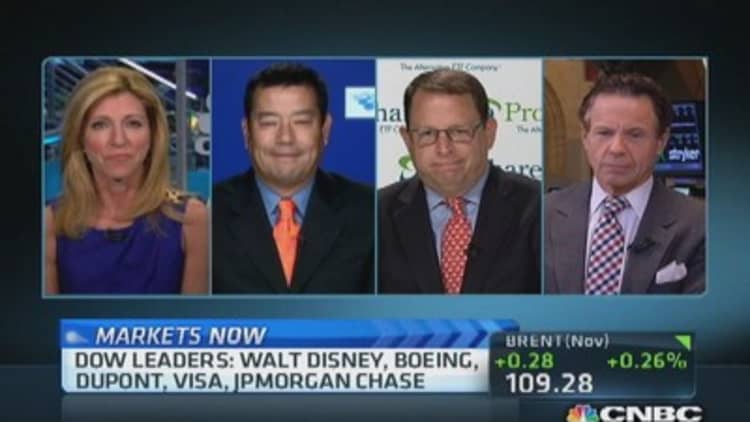Stocks finished higher Friday, recovering from the previous day's sharp losses and with the Dow reclaiming its footing above 15000 mark, despite Washington's ongoing budget stalemate.
(Read more: A tweet underscores why Washington is stuck)
"Those looking for another selloff to at least test yesterday's lows were left at the altar," wrote Elliot Spar, market strategist at Stifel NIcolaus. "Bottom-line: This Washington mess will pass; yes, it will have a negative impact on the economy and data releases over the near term but this is temporary. The market is able to look over the valley...No, I am not saying throw money at the market. You still have to be very selective while still using market rallies to hedge your weak technical holdings."
Still, the Dow and S&P finished in the red for the week. The Nasdaq, meanwhile, closed in positive territory for the fifth-consecutive week.
U.S. Major Index Performance
| Last | Today's % Change | 1 Week % Change | MTD % Change | YTD % Change | |
| Dow | 15072.58 | 0.51% | -1.22% | -0.38% | 15.02% |
| S&P 500 | 1690.5 | 0.71% | -0.07% | 0.53% | 18.53% |
| NASDAQ | 3807.75 | 0.89% | 0.69% | 0.96% | 26.11% |
| Russell 2000 | 1078.25 | 0.69% | 0.38% | 0.42% | 26.95% |
| CBOE VIX | 16.89 | -4.41% | 9.25% | 1.75% | -6.27% |
The Dow Jones Industrial Average gained 76.10 points, to close at 15,072.58, boosted by Disney and Boeing.
The rose 11.84 points, to end at 1,690.50. The Nasdaq climbed 33.41 points, to finish at 3,807.75.
The CBOE Volatility Index (VIX), widely considered the best gauge of fear in the market, fell below 17.
For the week, the Dow dropped 1.22 percent, the S&P 500 slid 0.07 percent, while the Nasdaq advanced 0.69 percent. For the week, United Technologies led the worst performer on the Dow, while Microsoft gained.
For the week, consumer staples led the key S&P sector laggards, while health care rallied.

"I find it painful to say this, but the government shutdown doesn't tend to affect markets at all," said Scott Clemons, chief investment strategist at Brown Brothers Harriman Wealth Management. "The debt ceiling debate, however, is a different matter. I think people are pricing in the political brinkmanship as 'business as usual' in DC. When push comes to shove, everyone knows the US cannot default on its debt and so some compromise has to be struck…we're likely to have uncertainty until the 11th hour."
Stocks briefly pared their gains after Speaker John Boehner said the House will not vote on a "clean" spending bill without conditions to end the government shutdown, and demanded spending cuts in exchange for raising the government's borrowing limit.
President Barack Obama canceled his trip to Indonesia to attend the APEC (Asia-Pacific Economic Cooperation) conference.
"But the Republican headbangers hardly look like budging. And in the meantime, the economic disruptions caused by the shutdown both in the U.S. and beyond, and arguably more significantly, the uncertainty and hit to confidence from fears over the debt ceiling not being lifted, will intensify," wrote Chris Scicluna, an economist at Daiwa Capital.
Speaking in Washington, IMF chief Christine Lagarde said that a failure to raise the debt ceiling before October 17 could hurt the global economy, and warned that U.S. economic growth could drop below 2 percent this year.
The widely-watched monthly government jobs report was delayed due to the shutdown. About 180,000 jobs were expected to have been added in September, up from 169,000 added in August.
(Read more: 'Squawk Box Jobs Report' pegs job growth at 158K)

"I actually think the bigger story is corporate earnings—that's the fuel that drives the market, not Washington DC," said Clemons.
Third quarter earnings season unofficially kicks off next week, with notable companies including fast-food chain Yum Brands and former Dow component Alcoa slated to post results Tuesday. Financial giants JPMorgan and Wells Fargo are due to report on Friday.
Facebook rallied after the social-networking giant's Instagram announced plans to start using ads in their feed in the next couple of months. Facebook acquired the photo-sharing company last April for $1 billion.
Potbelly skyrocketed more than 100 percent in its trading debut on the Nasdaq, after the sandwich chain priced its offering of 7.5 million shares at $14 a share, just above its expected price range. The stock trades under the ticker symbol "PBPB."
Twitter unveiled its S-1 documents for its public offering of $1 billion late Wednesday. Its ticker symbol will be "TWTR," but the social-media site did not indicate where its stock would be traded. Shares are expected to trade starting in November.
—By CNBC's JeeYeon Park (Follow JeeYeon on Twitter: @JeeYeonParkCNBC)
Coming Up Next Week:
MONDAY: Consumer credit
TUESDAY: NFIB small biz optimism index, international trade, Fed's Pianalto speaks, Fed's Plosser speaks, 3-yr note auction, Google announcement; Earnings from Alcoa, Yum Brands
WEDNESDAY: Mortgage applications, wholesale trade, oil inventories, 10-yr note auction, FOMC minutes, Nike investor mtg; Earnings from Costco, Family Dollar, Chevron (interim report)
THURSDAY: Jobless claims, import/export prices, Fed's Bullard speaks, natural gas inventories, 30-yr bond auction, Treasury budget, Fed's Williams speaks, Fed balance sheet/money supply, chain-store sales, Draghi speech
FRIDAY: PPI, retail sales, consumer sentiment, business inventories, Fed's Rosengren speaks, IMF annual mtg; Earnings from JPMorgan Chase, Wells Fargo
What's Trending on CNBC.com:


